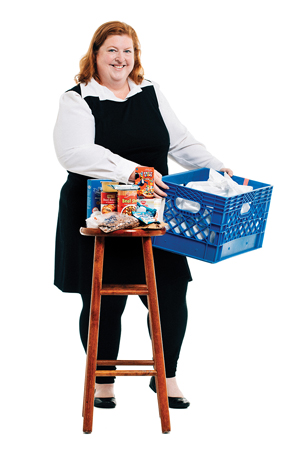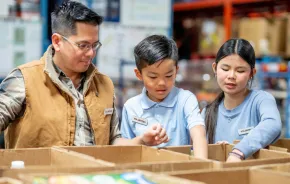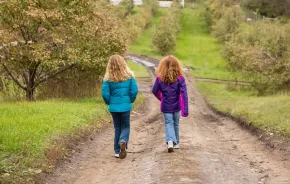
To call Backpack Brigade’s one employee a dynamo doesn’t come close to capturing the “get ’er done” attitude of Nichelle Hilton.
As executive director, chief food buyer, fundraiser and volunteer wrangler for the 3-year-old Seattle nonprofit, Hilton has a list of tasks that changes minute by minute, but she has a single-minded focus: Make sure no Seattle school kid goes hungry over the weekend. (And did we mention that she does this all part-time?)
From Backpack Brigade’s 3,000-square-foot warehouse in Seattle’s Chinatown–International District, Hilton helms an energetic group of volunteers and a six-person board in a weekly cycle of buying, bundling and delivering weekend bags of food to 880 Seattle kids who might not eat otherwise.
With music playing and jokes flying, volunteers organize the food and pack it into bags. Volunteer drivers then load the bags into their cars and drive them to 23 Seattle schools, where family-support workers at the schools make sure the bags get to those kids most in need. Each bag — there’s a “cook” version and a “no-cook” version, for kids who might be living in a hotel — includes food and snacks that add up to seven healthy, easy-to-prepare meals.
Founded in 2013 and achieving nonprofit status in 2015, Backpack Brigade has become the biggest player in the Food for Schools coalition, a group of organizations that together serve more than 3,000 students in Seattle. But this is still only about 17 percent of the estimated 18,000 students (out of a school population of 54,000) who receive free and reduced-price lunches, according to Hilton.
How did you get interested in this issue?
Since I was old enough to work, I have worked in nonprofits that make a difference to children. My most recent job was running a food bank. I went to a training at Northwest Harvest and saw [the documentary] “A Place at the Table” [about hunger in America]. It talked to hungry children and profiled them. It talked about what kids had to go through to get food and talked about the impact in the classroom.
One of the things that struck me was a little girl who said it’s really hard to focus on the times tables when you can see your teacher as a banana. To hear a student at that young age acknowledging the impact of her hunger was devastating.
Can you speak to the issue of weekend hunger and why it is often unrecognized?
A lot of times the most at-risk kids are only eating at school. They are relying on the free breakfast and the free lunch. While there are meal programs over the weekend, they lose the support system within the school to get to them.
Perhaps they’re unaccompanied minors. Perhaps their parents are working over the weekend. Perhaps there’s some neglect, and they have to feed themselves. There is also an entire population who is afraid of ICE [Immigration and Customs Enforcement]; they won’t fill out any paperwork, so they’re not being tracked anywhere.
How did Backpack Brigade start up to fill this need?
I started the program with one volunteer from the food bank who was a champion with me. We started [as a program of the food bank] … to serve our local school. It was eight bags. That’s all we thought we were going to do. By 2014, we were in [more] schools delivering bags. By 2015, we were a nonprofit. We have grown by, like, 500,000 percent.
What do you hear about the impact of your program?
[We hear stories from the] family-support workers in each school; one of the things we have heard is that attendance on Fridays has increased substantially because kids show up to get the food. We also hear that their ability to pay attention on Mondays has increased because they haven’t gone all weekend hungry.
We also hear the negative stuff, like “If we see one more box of chicken noodle soup, they’re going to throw it at us.” So we’re not having chicken noodle soup this year!
What are the small touches in the bags that make a difference to the kids?
We are so proud that we are able to have name-brand things: Kraft Mac & Cheese, Rice Krispies Treats, Hershey’s Kisses. That sends a message to the students that they are worth that [and] they deserve it.
Backpack Brigade has grown quickly. What do you hope to accomplish next?
Ideally, we go out of business, and there are no hungry children. But until then, I hope we grow, and the only thing that stops us is funding. We have the passion of these volunteers behind us; we have the infrastructure in place. We have our leadership.
With more funds, we can start to do some of the things we talked about before: reaching into the free and reduced lunch population number. [We’ve also had] requests from other school districts [but] we don’t have the funding to serve them yet.
I know that Backpack Brigade is just one of the things that you do. What else fills your time?
I have a huge family. I have a farm [in Duvall]. I founded and help run a Jane Austen book club. I have grandkids, I have a garden, I have every animal under the sun: chickens, sheep and horses and cats and dogs.
What kind of volunteer opportunities are open at Backpack Brigade?
Volunteers are highly needed on Wednesday and Friday mornings (8:30–11 a.m.) in the warehouse; and as drivers on Friday from 10 a.m. to 12 p.m. We can never get enough volunteers. They are the heart and soul of our agency. And they get to see a direct return to their volunteer hours because every single item they touch will be in the hands of a kid in need.











